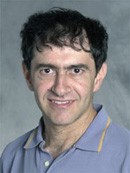2008 Hans and Marlies Zimmer International Scholar

The Department of Chemistry at the University of Cincinnati is very pleased to present the sixth series of lecture-visits by international scholars actively engaged in areas of frontier chemical research.
Amnon Horovitz obtained his PhD in biochemistry in 1988 at the Hebrew University of Jerusalem, Israel, working with Prof. M. Rigbi and Prof. R. D. Levine. His postdoctoral studies, in the laboratory of Prof. A. R. Fersht at Cambridge University, England, focused on protein folding and stability. During his PhD and postdoctoral studies, Amnon Horovitz pioneered the development of the double-mutant cycle method. In 1991, Amnon Horovitz joined the Weizmann Institute, Rehovot, Israel, and, between 2000-2007, he has served as the Chair of the Department of Structural Biology. In 2004, Prof. Horovitz became the Director of the Joseph and Ceil Mazer Center for Structural Biology at the Weizmann Institute.
Amnon Horovitz is one of the leading experts in chaperonin mediated protein folding. He has made landmark contributions to the understanding of the allosteric mechanism of chaperonin molecules, as well as the functional role of allosteric motions. Prof. Horovitz has been recognized with numerous awards, fellowships and honorary chairs, including the Hestrin Prize of the Israel Biochemical Society. Since 2000, he has been the incumbent of the Carl and Dorothy Bennett Professorial Chair in Biochemistry.
PROTEIN FOLDING IN THE MACHINE AGE: CHAPERONIN FUNCTION AND MECHANISM
Protein folding in the cell is assisted by molecular chaperones that, by analogy to human chaperones, act on proteins by preventing improper interactions between potentially complementary surfaces and disrupting improper liaisons that may occur. One family of molecular chaperones called chaperonins has a double-doughnut structure with a cavity at each end where protein folding can take place under confining conditions. Chaperonins are molecular machines that undergo large-scale ATP-driven conformational changes that are crucial for their function. The relationship between their machine-like movements and folding function will be discussed.